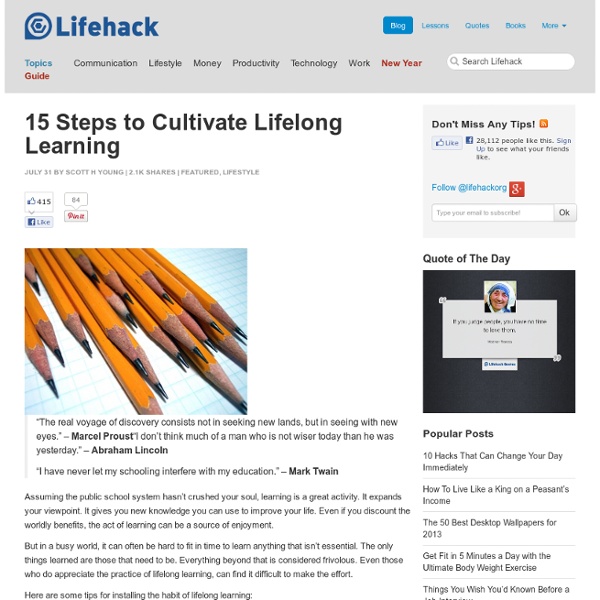15 Steps to Cultivate Lifelong Learning

Rethinking Homework
January/February 2007 Rethinking Homework By Alfie Kohn After spending most of the day in school, children are typically given additional assignments to be completed at home. This is a rather curious fact when you stop to think about it, but not as curious as the fact that few people ever stop to think about it. It becomes even more curious, for that matter, in light of three other facts: 1. 2. 3. It’s not as though most teachers decide now and then that a certain lesson really ought to continue after school is over because meaningful learning is so likely to result from such an assignment that it warrants the intrusion on family time. I’ve heard from countless people across the country about the frustration they feel over homework. What parents and teachers need is support from administrators who are willing to challenge the conventional wisdom. So what’s a thoughtful principal to do? 1. 2. 3. Quantity, however, is not the only issue that needs to be addressed. 4. 5. 6. 7. 8. 9.
10 Great Classroom Icebreakers
1. Self-Portrait. Have your students draw themselves. After they have done this, collect the papers and hang them up for the whole class to see. Now have students try to guess who the artists was for each picture. 2. At the beginning of the year, write a short letter about yourself as the teacher. 3. Give each student an index card. 4. Have the students get into a circle. 5. Pass around a sheet of paper and some pens. 6. Call out any month of the year and have all students born in that month come up to the front of the room. 7. Have the students draw pictures about what they like to do, what their favorite foods are, and what is their favorite subject in school. 8. Don't forget about this old time favorite part of class. 9. Have students write three things about themselves on a piece of paper. 10. Line up the students in two lines facing each other.
Educational games
WATCH: 6 Insanely Popular TED Talks to Make 2014 the Best Year of Your Life | TEDTalks
Posted: Updated: To kick off the new year, TEDWeekends is proud to present a compilation of six insanely popular TED talks from the past year. These talks inspired a tremendous amount of engagement from our community, and each one provides valuable insight that will help you get the most out of life in 2014. We thought this would be the perfect way to say "Thank You" to our thoughtful, curious and inspired readers and bloggers who have helped make this program such a success. Angela Lee Duckworth: This will be the key to your success this year Alexander Tsiaras: This will make you appreciate the wonder of life this year Amy Cuddy: This is why your body language will matter this year David Pogue: This is how to save time and make room for what really matters this year David Gallo: This will force you to explore more this year Jane McGonigal: This will help you play more.. and change the world this year Ideas are not set in stone.
Related:
Related:



